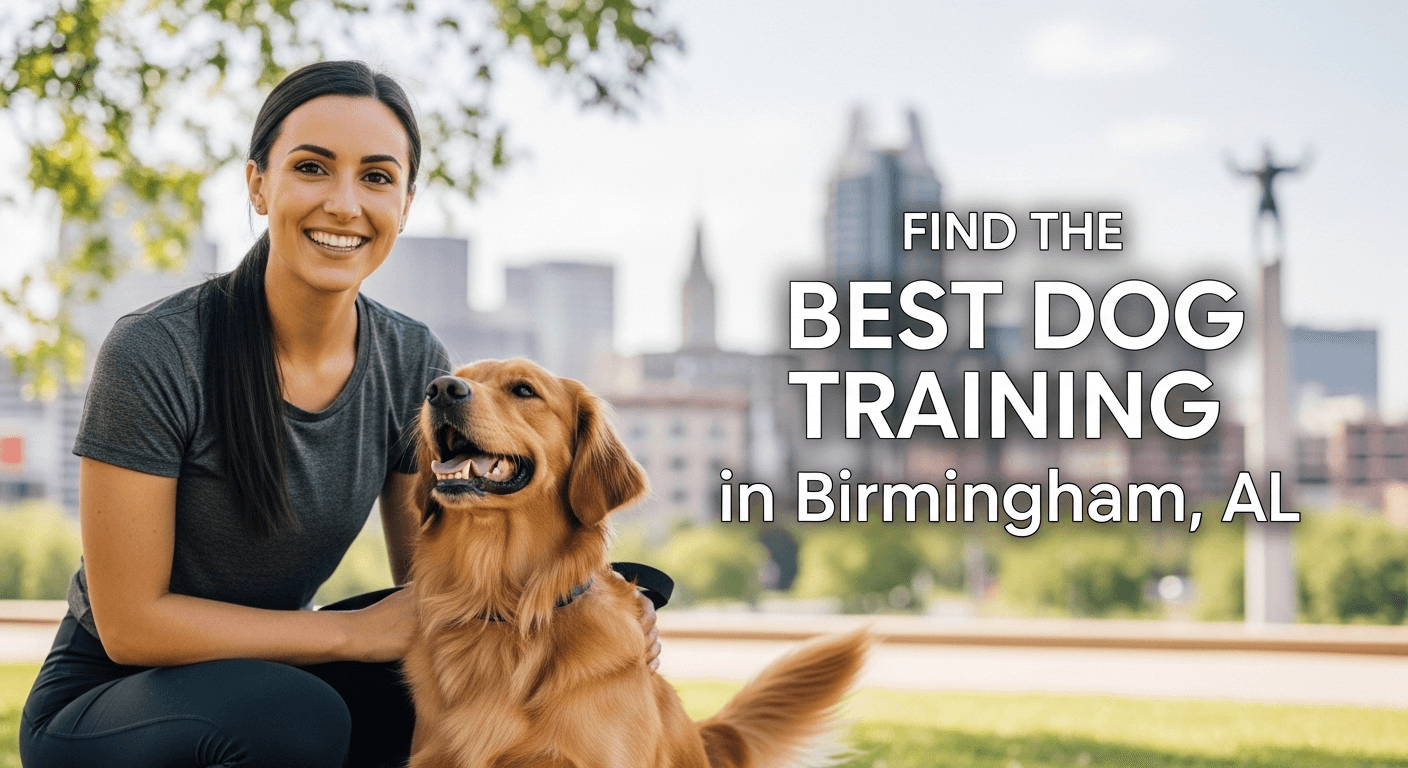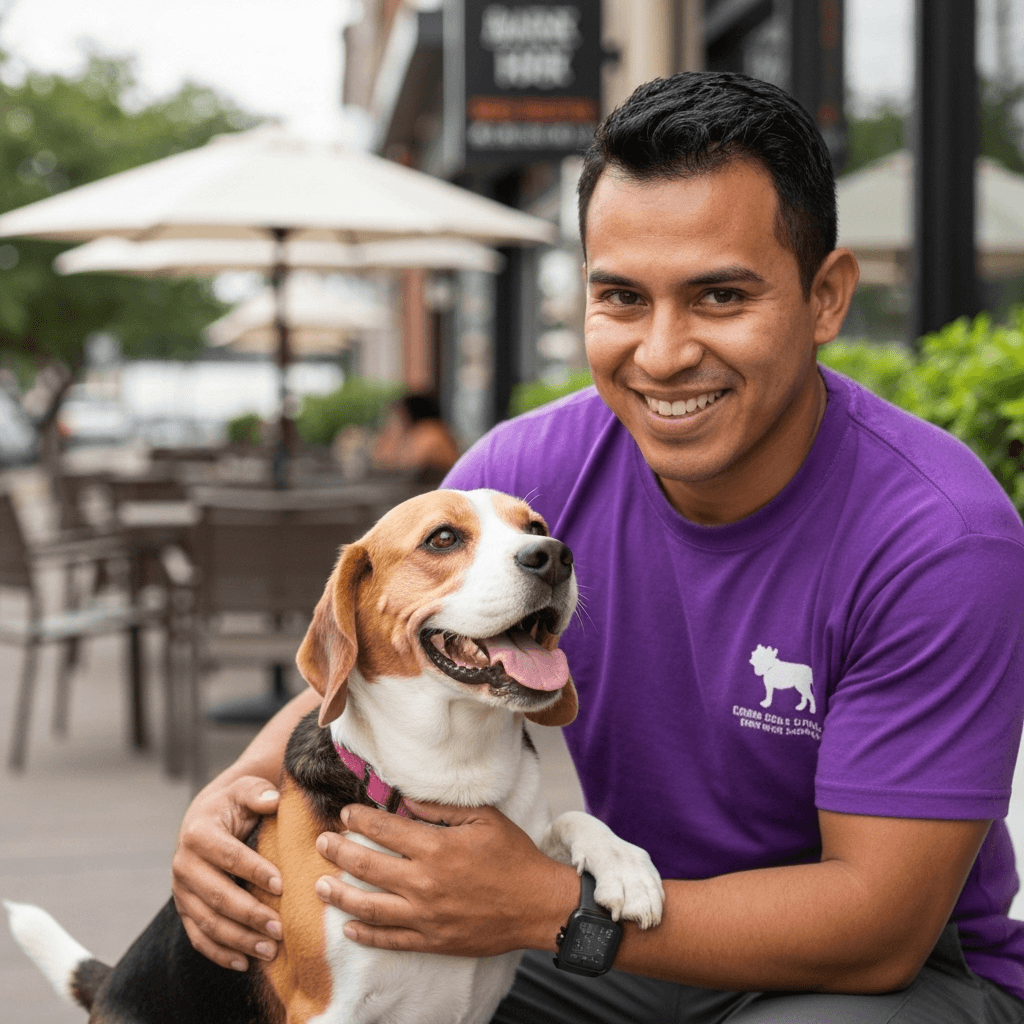Your Complete Guide to Choosing a Dog Trainer in Birmingham
Walking your dog through Five Points South or grabbing coffee at an Avondale café should be enjoyable, not stressful. But city life in Birmingham asks a lot from our dogs – they need to handle busy sidewalks, crowded festivals, apartment living, and all the excitement that comes with being part of the Magic City.
The right training makes all the difference. When your dog can walk calmly past Railroad Park’s weekend crowds or settle quietly while you chat with friends at a Highland Park restaurant, you both get to enjoy more of what Birmingham has to offer.
How to Choose the Right Trainer
Start by looking for trainers who use positive reinforcement methods. These approaches reward your dog for making good choices, which builds confidence and creates lasting habits. Your dog learns what you want them to do, not just what to avoid.
Ask about education and credentials. Professional certifications like CPDT-KA, KPA-CTP, or IAABC-CDBC show a trainer has invested in proper education. If your dog has anxiety, fear, or aggression issues, look for advanced credentials like CBCC-KA that focus on behavior modification.
Think about where you actually spend time with your dog. A good trainer will help you practice skills in real Birmingham settings – not just in a training facility. You’ll want your dog comfortable riding elevators in downtown buildings, walking past the farmers market crowds, or relaxing on restaurant patios throughout the city.
The best trainers teach you as much as they teach your dog. Expect homework, practice exercises you can do at home, and clear explanations of how to help your dog succeed in everyday situations.
Common Dog Training Methods Explained

Positive reinforcement works by rewarding behaviors you like, making your dog more likely to repeat them. When your dog sits politely to greet someone at Pepper Place Market, they get praise and treats. This approach builds trust between you and your dog while teaching them what you actually want.
Behavior modification helps dogs who are scared, reactive, or aggressive. It uses techniques like desensitization and counterconditioning to change how your dog feels about their triggers. This specialized work should always be handled by an experienced professional, especially for serious issues.
Puppy training focuses on socialization, house training, and basic manners during those crucial early months. Getting your puppy comfortable with Birmingham’s sights and sounds – from trolley bells to festival crowds – sets them up for a lifetime of confidence.
Day training lets a professional work with your dog during the day, then teach you how to maintain the progress. It’s helpful when you’re short on time but want faster results.
Group classes add controlled distractions while keeping costs reasonable. They’re perfect for basic obedience and help your dog learn to focus around other dogs and people.
Average Cost of Dog Training in Birmingham (Updated for 2025)
Training costs vary based on the trainer’s experience, session length, and how far they travel. Here’s what most Birmingham dog owners pay:
| Service Type | Average Cost (Birmingham Area) |
|---|---|
| Group classes (4–6 weeks) | $120 – $250 |
| Puppy classes (4–6 weeks) | $120 – $240 |
| Private lessons (60–90 minutes) | $85 – $160 per session |
| In-home dog training (60–90 minutes) | $100 – $180 per session |
| Day training (per week) | $350 – $800 |
| Board and train (2–4 weeks) | $1,600 – $3,800 total |
| Initial behavior consult (fear, reactivity) | $100 – $225 |
| Therapy dog training skills coaching | $100 – $180 per session |
Many trainers offer package deals that reduce the per-session cost. Expect to pay more for complex behavior issues, multiple dogs, or if the trainer needs to travel far within Jefferson County.
Local Laws and Practical Rules in Birmingham and Jefferson County
Understanding Birmingham’s rules helps you train safely and avoid problems with neighbors or authorities.
Your dog must be on a leash in all public spaces unless you’re inside a designated off-leash area. Keep that leash to 6 feet or shorter for better control and compliance with most local ordinances.
Excessive barking can lead to nuisance complaints from neighbors. If your dog barks when left alone or reacts to every sound, a trainer can help with separation anxiety and impulse control strategies.
Alabama requires all dogs to have current rabies vaccinations. You can find state requirements at Alabama Public Health. Jefferson County also requires dogs to wear their rabies tags, so keep that tag on your dog’s collar.
Most parks welcome casual training as long as you follow posted rules. But if a trainer wants to hold organized classes in public spaces, they may need permission from the property owner or park management.
Questions to Ask a Potential Dog Trainer

When interviewing trainers, these questions will help you find the right fit:
- What training methods do you use, and how do you keep sessions positive and low-stress?
- What certifications do you hold, such as CPDT-KA or KPA-CTP?
- How will you customize training for my specific goals and daily routine?
- Do you offer private lessons, group classes, or in-home sessions, and which would work best for my dog?
- How do you measure progress and decide when to add real-world distractions?
- What’s included in your pricing, and do you charge extra for travel or materials?
- Do you carry liability insurance, and can you provide proof?
- For behavior problems, do you work with veterinarians when needed?
- Can I get a consultation or written training plan before committing to a full program?
Local Birmingham Resources for Dog Owners
Birmingham has several great spots where you can practice training with your dog or let them burn off energy safely.
Remy’s Dog Park at Red Mountain Park offers fenced off-leash areas with separate sections for different sized dogs. Check current hours and rules at Red Mountain Park.
City Walk BHAM Dog Park sits right downtown under the interstate, making it convenient for urban dog owners. Find details at City Walk BHAM.
Loch Haven Dog Park in Hoover provides another fenced option if you’re in southern Jefferson County. The City of Hoover maintains information on the Lock Haven Dog Park website.
Railroad Park is perfect for practicing leash skills around joggers, families, and events. Review the current rules at Railroad Park.
Ruffner Mountain offers trails where you can work on focus and recall around wildlife and other hikers. Visit Ruffner Mountain for trail maps and visitor information.
Insurance and Business Basics for Trainers
Alabama doesn’t require dog trainers to have special state licenses. Most professional trainers in Birmingham hold basic business licenses and carry liability insurance to protect their clients and themselves.
If you’re considering board and train programs, ask about the facility’s cleaning protocols, emergency procedures, and how they handle medical situations. Responsible businesses will gladly share these details.

Common Questions About Dog Training in Birmingham
How much does in-home dog training cost?
Most Birmingham trainers charge $100 to $180 for 60-90 minute in-home sessions. The final price depends on travel distance, your specific goals, and the trainer’s experience level.
Is in-home dog training worth it?
In-home training works particularly well for issues that happen at your house – like door rushing, leash pulling in your neighborhood, or separation anxiety. You get faster progress because you’re working on problems exactly where they occur.
Can you pay someone to house train your dog?
Yes, trainers can set up detailed house training plans and coach you through the process. Day training can speed things up, but you’ll still need to be consistent with the schedule between professional sessions.
What is the 3-3-3 rule for dog training?
This guideline helps set realistic expectations for new or adopted dogs. The first 3 days often feel overwhelming for your dog, the first 3 weeks bring growing trust and routine, and the first 3 months show real progress with consistent training.
How long will it take to reach my training goals?
Most families notice improvements within a few sessions if they practice daily. Basic obedience usually takes 4 to 8 weeks of consistent work. Complex issues like reactivity or deep-seated fears may take several months of careful behavior modification.
What should I bring to group classes?
Pack a standard 6-foot leash, a properly fitted collar or harness, plenty of small training treats, water for your dog, and proof of rabies vaccination. Leave retractable leashes at home – they don’t give you enough control in group settings.
What’s the leash law in Birmingham?
Dogs must be leashed in all public spaces unless you’re inside a posted off-leash area. This means sidewalks, parks like Railroad Park, hiking trails, and anywhere else around the city require a leash.
Do I need a dog license in Birmingham or Jefferson County?
There’s no separate pet license required for most dogs, but Alabama’s rabies vaccination requirement means your dog needs a current rabies tag. Your veterinarian provides this tag when they give the vaccination.
What shots does my dog need in Jefferson County or Alabama?
Rabies vaccination is required by state law. Your vet will likely recommend core vaccines like distemper-parvo and may suggest Bordetella for dogs who’ll be around other dogs frequently. Check Alabama Public Health for current requirements.
Are dog trainers required to be licensed in Birmingham, Jefferson County, or Alabama?
No special licensing is required for dog trainers. Look for voluntary professional credentials like CPDT-KA, KPA-CTP, or IAABC-CDBC, and ask about liability insurance.
Where can I practice off-leash recall?
Fenced dog parks are your safest option for recall practice. Remy’s Dog Park at Red Mountain Park and City Walk BHAM Dog Park both allow off-leash training within their fenced areas. Remember to keep your dog leashed everywhere else in the city.
Which dog parks allow training around Birmingham?
Remy’s Dog Park, City Walk BHAM Dog Park, and Loch Haven Dog Park in Hoover all welcome basic training activities within their fenced areas. Just follow posted rules and be considerate of other park users enjoying time with their dogs.
What beaches or trails allow dogs for training?
Birmingham doesn’t have beaches, but several trails welcome leashed dogs. Red Mountain Park and Ruffner Mountain are popular choices for practicing focus around hikers, mountain bikers, and wildlife.
Do trainers need insurance to teach in parks?
While not legally required, most public venues and private property owners expect proof of liability insurance before allowing organized training classes. Ask your trainer to confirm they have coverage before attending group sessions in shared spaces.
What about service dog training and therapy dog training?
Service dogs have public access rights under federal ADA guidelines, while therapy dogs visit facilities by invitation only. Many Birmingham trainers can help with foundational skills and public manners for both. Make sure they understand the legal differences and can prepare you for any required evaluations.

Making the Right Choice
The best dog trainer for you understands both your goals and Birmingham’s unique environment. They’ll help you practice skills where you actually spend time – from Southside’s busy restaurants to the weekend crowds at various neighborhood festivals.
Look for someone who uses kind, effective methods and can explain their approach clearly. With consistent practice and the right guidance, you and your dog will be ready to enjoy everything Birmingham has to offer together.
